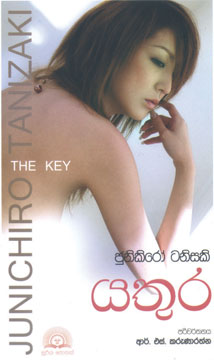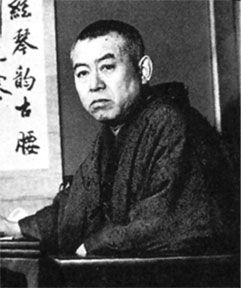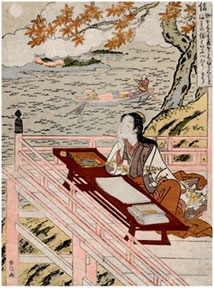The Key - The Japanese novel in Sinhala
Reviewed by Kalakeerthi Edwin Ariyadasa
The heart of mine is
only one.
It cannot be known by anybody else but myself.
1963 poem by Junichiro Tanizaki (1886-1965)
Gentle journalist and bi-lingual author, R.S. Karunaratne, has
addressed an excruciatingly troubling creative challenge. Armed with a
full, responsible and realistic awareness of the formidable of the task
undertaken, he has rendered into Sinhala, the Japanese novel Kagi (Key)
by Junichiro Tanizaki.
 From the time this globally-renowned, prolific Japanese
man-of-letters, Junichiro Tanizaki presented it to the public domain,
for the first time in 1956, this novel Key, has always been at the
centre of eddying and swirling controversies. From the time this globally-renowned, prolific Japanese
man-of-letters, Junichiro Tanizaki presented it to the public domain,
for the first time in 1956, this novel Key, has always been at the
centre of eddying and swirling controversies.
Critical accord
By popular acclaim and critical record, Junichiro Tanizaki, is
undoubtedly among the greatest writers in the long annals of Japanese
literary tradition.
The origins of the Japanese novel, extend to the distant past. The
saga Genji Monogatari (the tale of Genji) is credited as the world's
earliest novel. Written by court Lady Murasaki Shikibu, (978-1031) this
novel of epic proportions, is an intimate narration of life at court.
This historically significant novel was completed around 1011. From then
on, down to our own day, the Japanese novel, has commanded world
attention.
Yukio Mishima, real name Hiranka Kimitake (1925-1970) was nominated
for the Nobel Prize for Literature on three occasions. Yasunari Kawabata
(1899-1972), won the Nobel Prize for literature, in 1968. While awarding
the prize, the Nobel committee cited three of his novels - Snow Country,
Thousand Cranes and The Old Capital.
Prestigious tradition
Junichiro Tanizaki, whose work Kagi (Key) is converted into Sinhala
by R.S.K., is vehemently a product of this sustained and prestigious
tradition of novel writing in Japan.
Tanizaki, was recognised widely outside Japan by the translation of
his work Sasameyuki (Light snowfall-1948) into English, under the title
Makioka Sisters. I still recall this witty social satire, with a
titillating memory.
Translator R.S. Karunaratne, has opted to turn into Sinhala, probably
the most controversial work of Junichiro Tanizaki.
Some critics tend to consider this work to be a sadomasochistic
literary cruise. In essence, this work, explores the dark, unlit mazes
of the underworld of the human psyche. The style of narration that the
author settles for, befits this uncanny, perverse probing to the hilt.
This strange human chronicle is recorded in the form of diary
entries.
Co-protagonists
The work is structured with two equally weighted co-protagonists a
man and a woman. They are an ageing married couple. Each partner keeps a
diary. By definition, a personal diary is a repository of intimate
secrets. The assumption is that what is set down in such a diary is
strictly and exclusively for private use.
 |
|
Junichiro Tanizaki |
But, in this instance, there is a bewildering tacit understanding
between the two that the entries are for mutual consumption. The man is
55 and is learned an affluent. The woman is 44, beautiful and seductive.
The man suffers inner pangs, with the unsettling awareness of the
inklings of his failing sexual potency. He assumes that, the diary
entries of his sexual whimsicalities, will erotically arouse his spouse,
transforming her into an ecstatic bed-partner.
The lurid extents to which he takes his fetishistic frenzy are
detailed out in his entry for January 29 (pages 21-25 in the
translation)
The diary entries form the medium of erotic communication between the
two protagonists. A reader may occasionally suspect, that the
clandestine records may harmfully stimulate an untoward erotic fervour.
But, to my mind, to a reader who gets engrossed in this seemingly
lascivious carnal charade may teeter precariously on the verge of the
erotic and the pornographic. But, the author's clinical and
dispassionate approach prevents such an awkward emotional deterioration.
Through all these intriguing entries, the author deliberately leads
the characters towards a shocking finale. The three characters Ikuko,
the wife, Toshiko the daughter and Kimura the lover are all caught up
inescapably, in an intricate web.
Only the disturbing denouement will fully reveal the puppeteer who
manipulated the strings.
Generalisation
The novelist Junichiro Tanizaki tends to make a generalisation. The
average man may be attracted by the idea of concentrating on various
parts of the woman's body. The novelist makes the point that an
emotional transformation to enable holistic love could avert perverse
manifestations.
The work Kagi (Key) is an important document to highlight oblique
ways of human behaviour.
As for the translation by writer R.S. Karunaratne, I have discovered
in it a highly practical use of Sinhala idiom.
 In terms of the prefatory note, this is his debut in Sinhala writing,
at book-length. The first effort is quite effective since its style can
ensure reader absorption and reader-appeal. In terms of the prefatory note, this is his debut in Sinhala writing,
at book-length. The first effort is quite effective since its style can
ensure reader absorption and reader-appeal.
Female figure
The cover art may even please Janichiro Tanizaki, because the female
figure may be an approach towards the lady wooed by the writer of
entries.
I really admire the translator's level of word-use, because,
intimate, private and erotically moving situations are communicated with
exemplary restraint in this verson of Kagi.
The tradition of Japanese fiction, especially in its classical
manifestations can be wholesomely instructive to Sri Lankan writers,
when they make an effort to produce novels with a deep human impact.
Writer-translator R.S. Karunaratne could now perhaps turn to
Junichiro Tanizaki's Makioka Sisters, which will prove to be of greater
relevance to the indigenous way of life.
Translators enrich literature. R.S. Karunaratne's Key (Yatura) will
perform that service, quite effectively.
|


